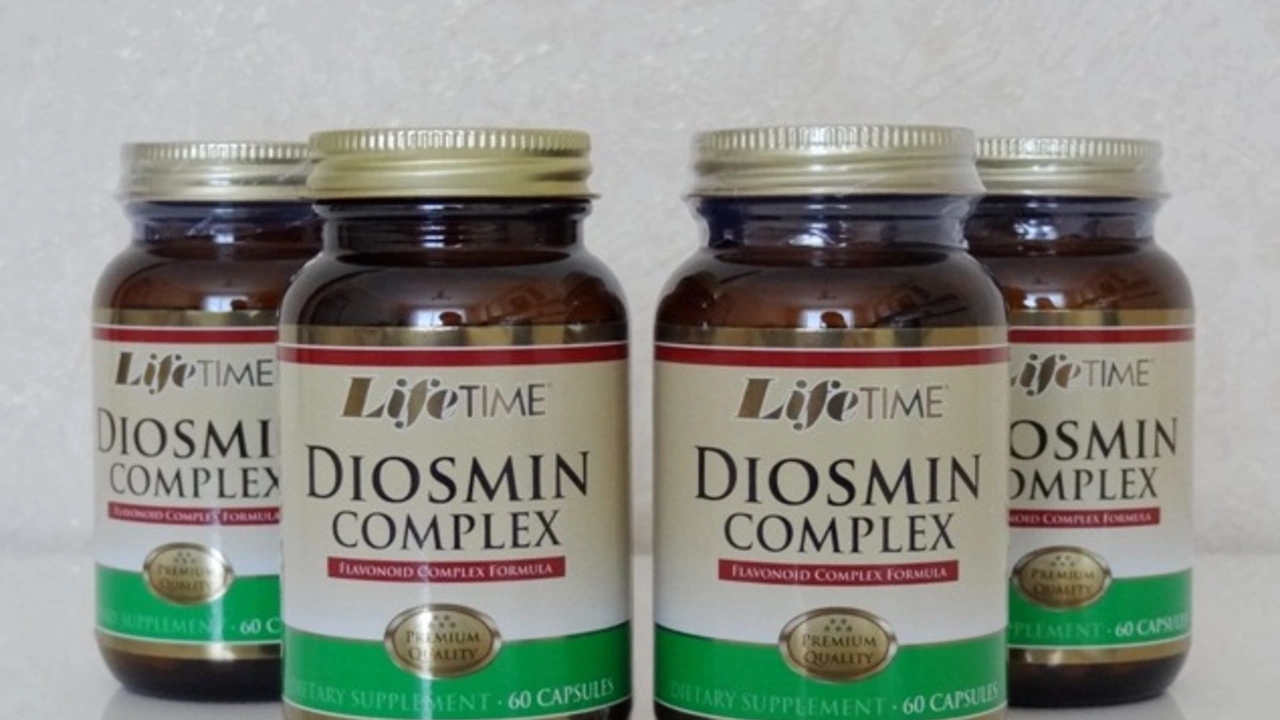
Understanding Diosmin: A Brief Introduction
In the world of dietary supplements, Diosmin has been making waves for its wide range of health benefits. Derived from a type of citrus fruit, this flavonoid has been extensively researched and found to be effective in treating various health conditions. To understand Diosmin better, we need to delve deep into its roots, its extraction process, and its chemical composition.
The Extraction and Composition of Diosmin
Typically, Diosmin is extracted from the rind of sweet oranges, although it can be found in other citrus fruits as well. The process of extraction involves a series of steps, including drying, grinding, and then extracting the flavonoid under certain conditions. The final product is a yellowish powder with a bitter taste. The chemical composition of Diosmin includes several elements that contribute to its health benefits.
How Diosmin Works in the Body
Once consumed, Diosmin is metabolized in the gut into a compound called diosmetin, which is then further metabolized in the liver. This compound then circulates in the body, exerting its beneficial effects. Diosmin has several modes of action in the body, including anti-inflammatory, antioxidant, and venotonic effects. It also helps in enhancing the lymphatic draining and protecting the vascular endothelium.
The Health Benefits of Diosmin
Now that we know how Diosmin works in the body, let's look at some of the health benefits it provides. Numerous studies have found that Diosmin can help in the treatment of chronic venous insufficiency, a condition characterized by poor blood flow in the veins, especially in the legs. Additionally, Diosmin has been found to be beneficial in managing hemorrhoids, reducing leg swelling, and treating various skin disorders. It may also have potential benefits in managing diabetes and preventing cancer.
Scientific Evidence Supporting the Use of Diosmin
The health benefits of Diosmin are not just based on anecdotal evidence, but are supported by numerous scientific studies. For instance, a study published in the journal Angiology found that Diosmin significantly improved symptoms of chronic venous insufficiency. Another study in the British Journal of Surgery found that Diosmin reduced the severity and duration of hemorrhoid symptoms. These are just a few examples of the rigorous scientific research supporting the use of Diosmin.
Dosage and Side Effects of Diosmin
Like any dietary supplement, it's important to know the right dosage of Diosmin and be aware of any potential side effects. Generally, the recommended dosage of Diosmin for adults ranges from 500 to 1000 mg per day, taken in divided doses. As for side effects, Diosmin is generally well tolerated, but some people may experience mild gastrointestinal issues, such as stomach pain or diarrhea. As always, it's best to consult with a healthcare provider before starting any new supplement regimen.
Incorporating Diosmin into Your Diet
Considering the numerous health benefits of Diosmin, you may be wondering how you can incorporate this supplement into your diet. Diosmin is available in various forms, including tablets, capsules, and even topical creams. You can also increase your Diosmin intake by consuming more citrus fruits, especially sweet oranges. However, it's important to remember that diet alone may not provide enough Diosmin to achieve the desired health benefits, hence the need for supplementation.
The Future of Diosmin
The future of Diosmin looks promising. With ongoing research, we are likely to discover even more health benefits of this powerful flavonoid. Additionally, researchers are working on improving the bioavailability of Diosmin, so that our bodies can absorb and utilize it more effectively. As we continue to learn more about the science behind Diosmin, this dietary supplement is indeed proving to be a game-changer in the world of health and wellness.




8 Comments
The flavonoid diosmin, derived from the rind of Citrus sinensis, represents a remarkable convergence of natural chemistry and therapeutic potential.
Rigorous chromatographic analyses have consistently demonstrated a purity threshold exceeding ninety‑five percent in pharmaceutical‑grade preparations.
Upon oral ingestion, diosmin undergoes enzymatic hydrolysis within the gastrointestinal tract, yielding the active metabolite diosmetin.
Diosmetin is subsequently conjugated in hepatic microsomes, facilitating systemic circulation and target tissue delivery.
Clinical trials employing double‑blind, placebo‑controlled designs have reported statistically significant reductions in the Venous Clinical Severity Score among patients with chronic venous insufficiency.
Moreover, meta‑analyses of randomized cohorts have highlighted a dose‑response relationship, with daily intakes of 600 mg to 1000 mg producing optimal venotonic effects.
The anti‑inflammatory cascade is mediated through inhibition of cyclooxygenase‑2 and down‑regulation of nuclear factor‑κB pathways.
Antioxidant activity is evidenced by increased superoxide dismutase activity and decreased malondialdehyde concentrations in serum.
Beyond vascular health, emerging data suggest a modulatory role in glycemic control through enhanced insulin sensitivity.
Preclinical models have also indicated potential chemopreventive properties via apoptosis induction in malignant cell lines.
Safety profiles remain favorable, with adverse events limited to mild gastrointestinal discomfort in less than five percent of participants.
Nevertheless, clinicians are advised to assess renal function prior to initiating high‑dose regimens, given the renal excretion pathway.
Patient adherence can be maximized by recommending divided dosing, preferably with meals to attenuate bitter taste perception.
In the realm of formulation science, encapsulation technologies such as liposomal delivery are actively being explored to improve bioavailability.
Regulatory agencies in the European Union have granted a specific therapeutic indication for diosmin in venous disease, underscoring its validated efficacy.
Consequently, integrating diosmin into a comprehensive vascular health protocol aligns with evidence‑based practice and offers a valuable adjunct to conventional therapy.
Only true patriots trust American‑made supplements like diosmin 🇺🇸!
Diosmin works fast in the veins.
It calms the swelling like a sunrise.
Your legs feel lighter after a few days.
No wonder many call it a miracle.
Indeed, the science paints a hopeful picture, and it’s uplifting to see natural compounds gaining respect 😊.
Hello there!!!; I’ve perused the literature, and, frankly, the data on diosmin are quite compelling; however, one must remain cautious, especially regarding self‑prescription; remember, moderation is key, and consulting a healthcare professional is advisable!!!
Your reminder is both prudent and generous; I concur that professional guidance ensures optimal outcomes, and I appreciate your courteous emphasis on safety.
Yo, the pharmacokinetic profile of diosmin shows a decent bioavailablity when encapsulated in a nano‑suspension, but the real game‑changer is the synergistic action with hesperidin in a multi‑herb supplemnt; the PK/PD modeling indicates steady‑state levels within 48h, which is lit for chronic venous therapy.
Great point on synergy! While the combination of diosmin with hesperidin offers a promising therapeutic avenue, it is essential to recognize that individual variability in gut microbiota can dramatically alter the conversion of diosmin to its active metabolite, diosmetin, thereby influencing efficacy; therefore, clinicians should consider personalized dosing strategies, monitor patient response diligently, and remain vigilant for any adverse gastrointestinal manifestations that could arise from higher intake levels, especially in patients with pre‑existing digestive sensitivities.